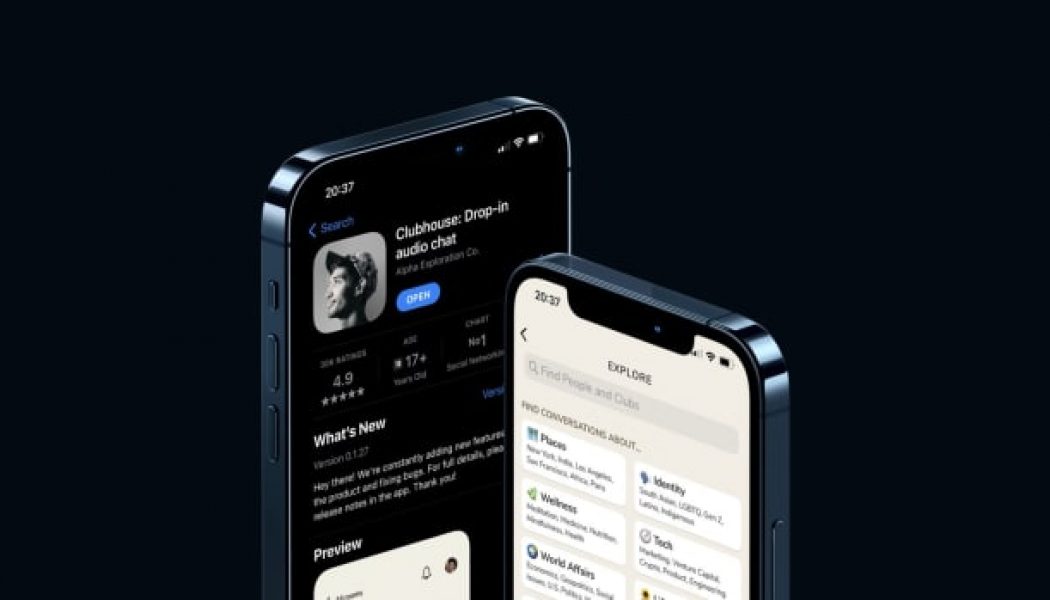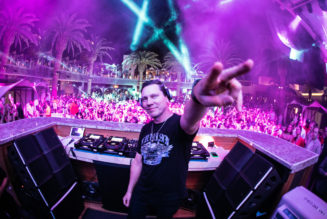Prior to the COVID-19 pandemic, it wasn’t uncommon to find music industry executives, artists, and other key players in the business hanging out at bars, music venues, and industry conferences. However, with the unprecedented closure of most live entertainment spaces, the industry has been forced to find a new hangout spot.
Launched in April 2020, Clubhouse was there to save the day, providing a safe space for professionals to get together and continue their conversations.
What is Clubhouse?
Clubhouse is a social networking platform that allows users to host and join real-time, audio-only conversations. The app features the communal interaction of social media apps like Instagram and combines it with the informational aspects of digital seminars often found on Zoom.
Users can jump from chat room to chat room and participate in live, panel-style discussions. Nothing is recorded, which lifts the pressure for speakers to remain formal and appropriate in their language. Almost like a phone call, the resulting conversations are casually intimate and unrestricted. The app is still in beta and is currently invite-only, but has begun to attract international attention as big names such as Mark Zuckerburg, Drake, and Oprah Winfrey continue to join.
Why has Clubhouse become so popular?
Despite its exclusivity, Clubhouse has begun to gain mainstream popularity. At the beginning of February, Tesla founder Elon Musk hopped in a Clubhouse room to interrogate Robinhood CEO Vlad Tenev on the recent GameStop stock scandal. The room quickly maxed out at its limit of 5,000 users and the app saw over a million downloads in the ensuing 10 days.
In a technological world oversaturated with carefully curated, strategically planned content, Clubhouse has broken through by providing real-time, raw material without the pressure of a camera. It gives users the opportunity to concentrate on hearing each other’s voices without the distraction of visuals seen on traditional social media platforms. A 2019 study by Stockholm University looked at the power of the human voice:
“When people use the voice to communicate, listeners do not only interpret the words that are said, the verbal content, but also the information contained in how the words are said, the nonverbal content,” according to the study’s findings. “A large portion of the nonverbal content of the voice is thought to convey information about the emotional state of the speaker.”

With a $1 billion valuation, Clubhouse has emerged as one of the world’s largest social media startups.
ZUMAPRESS.com
Hearing someone’s voice carries significantly heavier weight than reading their text messages, emails, or Instagram captions because it conveys emotion and elicits a visceral response. Clubhouse focuses specifically on human interaction via speaking, encouraging listeners to truly hear what the speaker is saying and feeling. This valuable form of communication leads to a stronger, more human connection and therefore more meaningful conversations.
Clubhouse’s ability to foster such a casual, open environment also cultivates a level of intimacy that people have longed for due to isolation contrived by the pandemic. It’s easy to jump from conversation to conversation, listen in for as long as you care to, and connect with new people in real time—almost like the atmosphere of a networking conference—but digital. By promoting exploration, growth, and creation, Clubhouse creates a generally positive learning culture open to all who are willing to maintain respectful and effective communication. The platform opens up a whole new world of information and networking to its users via its diverse range of people, subjects, industries, and interests.
How is Clubhouse being used in the music industry?
On February 8th, Timbaland’s premier music platform Beatclub hosted a Clubhouse room featuring Scott Storch, Mike Dean, Jozzy, and the music producer himself, among others. The group of acclaimed musicians discussed tips for producers, the future of production, and shared their own experiences in the industry, attracting thousands of listeners as they provided exclusive insights. Dozens of rooms like these are hosted every week, with top music executives and artists discussing trends, opinions, and advice for navigating the industry.
These chat rooms have become an essential part of networking in pandemic culture. Most people join the app looking to broaden their network in some way. Due to the intimate nature of Clubhouse, it’s convenient to have informative discussions and meet new people on it than other social media apps. Strong conversations lead to strong connections, and following up on these discussions has become a huge part of meeting people in the industry. Several music industry clubs offer special rooms dedicated solely to networking and connecting. Sometimes people even host or join these rooms looking to hire interns and new employees.
However, these panel-like chat rooms are not the only ones amassing significant audiences among music industry Clubhousers. Several other original ideas have emerged from the artistic community as a way to spearhead creative discussion, such as virtual jam sessions, songwriting workshops, album premiere parties, and radio station-like rooms where DJs can play tracks. Unsurprisingly, the music business has found a multitude of innovative ways to utilize Clubhouse.

Mark Zuckerburg, Drake, and Oprah Winfrey have all joined Clubhousem which is said to have 2 million active weekly users.
How can artists use the platform?
Clubhouse provides many opportunities for artists to take advantage of their platform.
Finding collaborators
Clubhouse’s vast array of creators and business professionals offers a huge opportunity for connecting with potential collaborators. Whether an artist is looking for producers and other artists to make music with or hoping to connect with managers, A&R executives, and indie labels, the app is a great place to look. However, it’s important to participate in conversations and find natural connections. The platform is predicated on genuine, authentic communication, so taking to it for purely promotional purposes will not breed good results.
In order to find collaborators, it’s important to build out your personal profile. You can strengthen your profile by using a professional headshot for your profile picture, creating a concise, professional bio, following people you know, and connecting your account to your other social media channels. Doing so creates familiarity and gives people a better idea of who you are.
Connecting with fans
Because Clubhouse allows users to connect with each other in real time, it automatically increases the element of tangible human interaction that’s missing on most social media platforms. Artists can use this opportunity to connect with their fans and form sincere relationships with them.
There are many creative ways to engage fans on this platform, including hosting a chatroom with other artists, premiering new music, having a meet-and-greet with fans, and writing songs live and inviting people to be part of the process. Clubhouse provides a great way for fans to get to know the real you, in real time.
Clubs
Joining clubs is one of the easiest ways to connect with people and find relevant conversations on Clubhouse. Clubs are generally very open and supportive environments as long as you are respectful of others and follow the club’s rules. Groups such as Music Industry Network, Music HQ, Music Industry Execs, New Music Review + Music Business 101, and The 808 Wave host rooms for networking, advice, panel discussions, listening parties, and more.
The Future of Clubhouse
As Clubhouse continues to attract elite musicians, there’s no doubt that it will continue to grow in importance in the music industry. As of February 2021, the app is said to have 2 million active weekly users and recently received a $1 billion valuation, making it one of the world’s largest social media startups.
After receiving a notable investment from Silicon Valley-based venture-capital firm Andreesen Horowitz, Clubhouse recently announced plans to invest in creators, including a Creator Grant Program and monetization features such as tipping, subscriptions, and ticketing. Considering the app is currently in beta version, now is the ideal time to start building a Clubhouse community before it becomes oversaturated.










